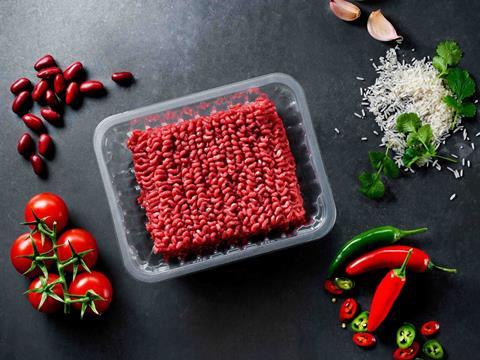
Klöckner Pentaplast has relaunched kp Elite, its certified recyclable modified atmosphere MAP tray made entirely of rPET, in pursuit of a closed-loop packaging system for protein products.
kp Elite is thought to be the only lightweight, mono-material, modified atmosphere packaging tray to be certified by RecyClass as 100% recyclable. Reportedly, it can be seamlessly integrated into existing PET recycling processes – and, in combination with the kp Zapora padless tray and the kp FlexiLid EH 145 R barrier lidding film, forms a fully recyclable, case-ready MAP solution from a single supplier.
Expected to deliver ‘exciting new potential’ in the protein packaging sector, kp Elite is hoped to be an end-to-end circular solution that enhances efficiency in processing and packing. Klöckner Pentaplast states that the tray requires less reworking and repacking, as it is designed to form a hermetic seal in less time and at lower temperatures.
As such, it is set to block out contaminants and minimize leaks, extending product shelf life. It also offers a peelable seal and clarity that the company describes as ‘exceptional’.
“By communicating kp Elite’s closed loop credentials, we’re aiming to drive the fresh protein market further than ever before,” said Cecilia Guardado, marketing director of Trays at Klöckner Pentaplast. “Packaging circularity is one of the biggest challenges in the protein market, but when combined with our kp Tray2Tray initiative, kp Elite takes a vital step forward in reducing waste and promoting a more resource-efficient protein packaging ecosystem.
“Part of our kp ‘Investing in Better’ sustainability strategy is that we want to make 100% of our packaging solutions recyclable by the end of 2025, and kp Elite is another crucial step in achieving that. Plus, with our kp Zapora padless tray technology, we’re able to enhance the consumer experience.
“We’re ticking a lot of boxes at once. We’ve listened to both our customers and the consumer, to create a solution that can do it all.
“We’re on a mission to prove that sustainability and performance can coexist without compromise. Combined with kp Zapora and kp Tray2Tray, kp Elite is a clear example of our commitment to efficiency, performance, and sustainability, particularly in light of the upcoming Plastics Packaging Waste Regulations, which mandate the use of post-consumer recyclate (PCR) in packaging. There are huge benefits, not just for producers, packers and distributors, but also for consumers who value its ease of use and clarity.
“We work to an ethos of ‘Packaging with integrity’, and our values are made clear through everything we do. kp Elite is a prime example of this in action; while the industry uses higher PCR or virgin material based on cost, we commit to using 100% PCR where possible – and communicating this on-pack.
“With this relaunch, we are challenging the conventional choice of polypropylene (PP) trays for protein packaging and showing a better way forward. We are paving the way for a future where rPET-based kp Elite leads the industry in sustainable, high-performance packaging.”
In related developments, two modified atmosphere solutions reached the finals of this year’s Sustainability Awards in the pre-commercialized Active and Intelligent category. The U.S Department of Agriculture’s Agricultural Research Service (USDA-ARS) was nominated for its clamshell with modified humidity, while Wageningen University & Research and Istanbul Technical University’s modified atmosphere packaging for fresh produce was also recognized.
Masterpack Group was also announced as the winner of NVC Netherlands Packaging Centre’s De Gouden Noot competition last year, taking home the golden walnut trophy for its application of Modified Atmosphere technology to FIBCs.
In another relaunch, Henkel is hoping to improve its plastics footprint by releasing its bonding and sealing portfolio in cartridges containing up to 95% post-consumer recycled plastic.
If you liked this article, you might also enjoy:
The L’Oréal approach to packaging sustainability
The way we talk about plastic needs to change – here’s how to get it right
What steps is Apple taking to make its packaging more sustainable?













No comments yet